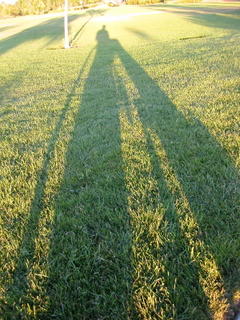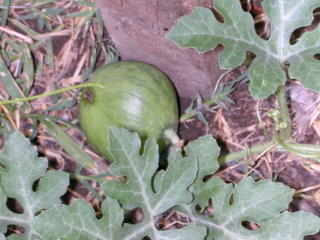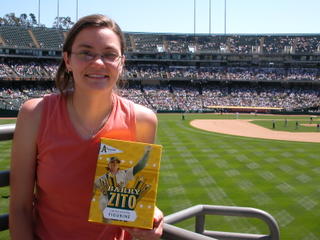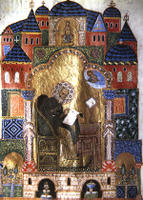I promised some sermons, so here is one that I preached a little while ago at All Saint's Chapel at
Church Divinity School of the Pacific. It was preached at the International Student's liturgy, and the readings were from Nehemiah and Matthew. I post it because the gospel is the same one we heard last Sunday, and because I think this still has some relevence for the Anglican Communion.
---
I fly home to Winnipeg a couple of times a year. When the pilot tips the wing, and the sky is clear, you can see the flatness of the prairies stretching to the horizon. It's like a well ordered patchwork quilt of highway, neat plots of farmland, and the straight rows worked by the farmer.
And it's as if we are all on that airplane, all of us with a window seat. And we're watching a farmer driving his tractor during spring seeding. The farmer is driving his tractor on the highway, not an unusual sight in itself. But we are confused to see that the farmer is leaving a narrow trail of seeds behind him. On the highway.
And we wonder – Is the farmer asleep at the wheel? Because he surely isn’t doing this on purpose.
Well he’s not asleep, because the farmer has now pulled onto the gravel shoulder of the highway. And now the farmer is putting seeds on that gravel. And the farmer turns his tractor into the ditch, the weedy strip between the good soil and the highway.
And he is proceeding to drop seeds all over the ditch. And finally, after fully seeding the highway, the shoulder of the highway, and the ditch – the farmer only now begins to seed the dark earth where his seeds will grow into a viable harvest in the fall.
If this sounds like odd farming practice, it is.
And that is what is so odd about this parable. The sower of seeds seemingly wastes his time, sowing seeds where he already knows they will not grow. He is sowing seeds where, even if they do grow a little, they will not come to bear fruit.
It's safe to say that this parable, a story about casting seeds on the path, on rocky ground, and among the thorns, is not about good farming practice.
Jesus says as much in the passage we heard today, “the explanation of the parable of the sower,” though to call this passage an explanation seems terribly optimistic; the explanation is as cryptic as the parable itself. What this word of the kingdom is, exactly,
remains unclear to us. But we do know that the seed is this mysterious word of the kingdom, and that the word takes root when it is received and understood in the heart. But the word can fail through distraction, persecution, and misunderstanding. It would seem that some people get it and understand this word of the kingdom, and others don’t.
It is a story from an early Christian community struggling with a basic question.
For this early community knew a Christ that offered the Word of the Kingdom to many different people. And the scandal was that though many Jews received this Messiah, many others did not. And adding insult to injury, even some Gentiles were receiving Jesus, and inheriting a promise that was not even made to them.
It was like Matthew's community was reading a map that had thick black lines, the thick black lines of the walls of their city of faith. But looking up from that map they found that the walls were crumbling. Their community was taking a different shape than they thought it would.
The same question behind this parable continues to be asked today, because it has roots in the fact that we so often simply do not understand each other. The same question that so many within the church are asking about others in the church, the question behind the parable: “Why is it that those who are so close to us just don’t understand what we understand?” This is a question being asked all over the communion.
And so this parable, and the explanation of this parable, offers a solution: some are able to hear and understand. Others are not. This is not a statement meant to demonize one part of the society that this community lived in. It is simply description of the world that the disciples knew, and that we know. Some got what the community preached, and others did not.
But I would like for us to take the time, before we look at what it is that some get and others don’t, to see the oddness of this story. Because it is a truly odd story about an odd divine agent. A sower who strangely continues to waste time sowing where nothing will be reaped, a divine agent that curiously, and lovingly wastes time, offering gifts that he knows will not be received.
This is not a story about farming, but a parable about radical generosity.
Let’s take a moment and turn to the story of Nehemiah that we heard just now, because it will also shed some light on some of the problems presented to the church. Turning to Nehemiah, we see a different kind of story, from a different time. Nehemiah is working in the Royal court of Persia. The Hebrew people have been scattered in exile, but are now in the process of returning home. The rebuilding of Jerusalem has begun, but the project is unfinished. The temple has been rebuilt, but there is another shame felt by Nehemiah and the Judahites. Their city, Jerusalem, has no wall.
So Nehemiah goes home to Jerusalem, and begins to build the wall, a necessary step in building not just the city, but also a differentiated society and culture. Nehemiah goes home to both rebuild and preserve the unique character of the city and people of Jerusalem, and to end the shame of a city without walls.
These two stories, the parable of the sower and his radical generosity, and the story of the building of the walls that preserve the identity of Jerusalem, represent to us some of the challenges and temptations offered to the church, two possible directions during times of change and crisis.
There is the temptation on all fronts to build the walls of our city, walls that preserve the distinct character of a certain viewpoint, or preserve a certain identity by separating ourselves from the conflicting identities of others. There is the temptation to continue reading a bad map, without seeing that the walls between us in this church are already rubble, and that we are in relationship with those outside our walls, whether we like it or not.
My hope is that we have a bad map of an ancient city, where the protecting walls are drawn with thick black lines. My hope is that upon arrival at that city, we find that the map was wrong, that the walls fell down long ago, and are nothing more than piles of rubble, still marking ancient jurisdictions but without being a barrier to entrance or departure.
Yet I hope that we are still hesitant in drawing new maps of what the city of our faith should look like. Nor do I hope that we build our walls to match our maps.
I guess I like the idea of a church with crumbling walls, and no budget for upkeep, with strangers entering, friends leaving, and people speaking in ways I don’t understand.
This is my hope because I want to look up from the maps we have, and see Hong Kong Chinese, Korean, Canadian, German, First Peoples, Phillipino, God help us even Republicans and Democrats, those of different ethical convictions, I want to look up and see us all worshipping together in Berkeley, California.
All of us living the question, “Why exactly is it that some people don’t understand what I understand?” Just as in the parable of the sower, I hope we can think that we are somehow better off following the example of the absurd generosity of that sower, wasting our time with those who we are quite sure will never quite share our understanding.
We can read this parable to give us some direction in how to be church, as I have here. But we need to be honest, and say that the community where this parable continued to be told was not struggling with the same things we are struggling with today.
They were not struggling with issues of morality, or ecclesial politics, or the enculturated reception of certain theological doctrines.
And so we return to that hanging question: what exactly is the Word of the Kingdom?
What the Word of the Kingdom was for that Matthean community, the word that some held tightly in their heart, while others let it fall away, or let it grow without care, was something more basic to our faith. It is the word that first breached the wall, the word that frees us. The word of the kingdom was the story of Jesus himself, the Holy one of Israel, the promised Messiah, who was crucified. The Word of the Kingdom was that this same Jesus, the same Holy One of Israel, the liberating Messiah, rose from the dead. That is what some got, and others didn’t get – the story of the crucified one, the risen one.
Those were the first faint lines on the map of what would become the church.
And this is where we should look if we are to draw these lines at all, around us or between us. We should be drawing the lines of a crumbled wall, walls not of protection or isolation but a wall that many might walk over and through.
The crumbled walls of a city of a radically generous people, of a people with a heart like the dark brown earth, a heart where we receive this Holy one of Israel, like a bride into the bed-chamber of a lasting marriage.
A people in fruitful union with the object of all their hopes and desires.
Because this is Christian unity: the holding tight of the Word of the Kingdom, our embrace of the crucified one, the risen one.
 I've been getting a little exercise in the evenings. There's no good excuse, here in Davis. Living on the side of a hill, as I did in Berkeley, made any evening stroll a good way to wear down my elbow joints. But it's flat here, and there are bike paths that wind all through my neighborhood. I couldn't ask for a more pleasant way to get out of the house.
I've been getting a little exercise in the evenings. There's no good excuse, here in Davis. Living on the side of a hill, as I did in Berkeley, made any evening stroll a good way to wear down my elbow joints. But it's flat here, and there are bike paths that wind all through my neighborhood. I couldn't ask for a more pleasant way to get out of the house.








